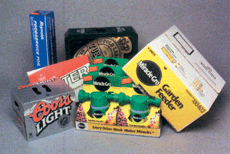
The carton-making process is simple. The corrugated box consists of two processes: printing and forming. The printing process equipment includes offset printing, flexo printing, and gravure printing; the molding process equipment includes single-sided machines, cardboard lines, and slotted/die-cut/sticker machines. Printed substrates can be sheet-fed, web, and multi-ply paperboards; paperboard machines can laminate face and non-printing paper. If you print after forming, it is called preprinting; after forming, it is postprinting.
Sheetfed offset printing is a traditional preprinting method. It is currently the main processing method of domestic high-end color carton, offset printing preprinting mode is not large, but the process is complicated. The carton factory needs to configure a four-color full-open offset press (such as Roland 800), single Surface corrugating machine, veneer machine, polishing machine, sticky box machine and die-cutting machine have many processes, low efficiency, and poor environmental safety. Since its rise in the 1990s, flexo printers have developed rapidly and have become a convenient and mainstream method for carton colorization. It is generally composed of three or more color groups and slotted/die-cut groups. It prints ink on the three-layer and five-layer cardboards. This type of carton printing, which is called flexo-printing, requires only two sets of printing methods. Equipment, cardboard lines and wide-format flexo presses. The post-printing process uses flexible photosensitive resin plates to lightly print on corrugated paperboards. The inevitable spread of dots causes the hierarchical printing to be limited to less than 80 lines. The degree of exquisiteness is not as good as offset printing. Most of the post-printing can only be equivalent to the mid-range level of color carton. The high-grade post-printing technology of the UV coating system, such as BOBST's MASTERFLEX flexographic printing machine, is close to the offset printing level, but the machine cost is not affordable for a general carton plant. The most imported flexographic presses in China are from Taiwan, and domestic models such as the South China Sea East and Jingshan light aircraft are also common.
The carton industry in Europe and the United States in the 1980s introduced a new preprinting technology, the satellite web flexo. The machine is dominated by a Central Impression Roll for printing, drying, glazing, and curing of wide webs. The dot printing reaches 150 lines, and the visual effect is the same as the offset fineness. Feeding speed is 150 meters per minute, a six-color preprinting machine with a width of 1200mm can print 400,000 standard 640ml bottled cartons every day (3 shifts), and the production efficiency is 4 times that of a full-open offset press. (To be continued)
An aluminum fence is a type of fencing made from aluminum metal. It is a popular choice for both residential and commercial properties due to its durability, low maintenance requirements, and attractive appearance.
Aluminum fences are known for their strength and ability to withstand harsh weather conditions, making them suitable for outdoor use. They are resistant to rust and corrosion, which is a significant advantage over other types of fencing materials such as iron or steel.
In terms of aesthetics, aluminum fences come in a variety of styles, colors, and designs, allowing homeowners to choose a fence that complements their property's architecture and landscaping. Whether you prefer a traditional picket fence or a more modern and sleek design, there is an aluminum fence option available to suit your taste.
In summary, aluminum fences are a popular choice for their durability, low maintenance requirements, and attractive appearance.
Aluminum Fence panel,metal fence
HEBEI DOUDOU METAL FENCE PRODUCTS CO.,LTD. , https://www.doudoufencing.com